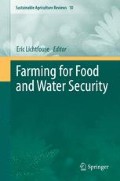Abstract
This report unexpectedly shows that farmers performed better than extension officers for crop management. Local knowledge of small-holder farmers should be considered to enhance technical skills in crop production under irrigation. Small-scale farmers of the Tugela Ferry Irrigation scheme in South Africa own 0.1 ha plots. The plots can be increased by leasing from other plot-holders who fail in crop management. This study was initiated in response to the fact that farmers were constrained by the lack of technical approaches for crop management. The farmers relied on technical advisors, known as extension officers, to improve technical knowledge and skills required for successful production of marketable products. The study used participatory rural appraisal as a tool to identify key technical and institutional constraints to crop production. Matrix and pair-wise ranking were used for data classification and analysis. The key outcomes of the study were (i) identification of 12 and 18 desirable attributes of a good extension officer and a good farmer, respectively and (ii) identification of 18 problems constraining crop management practices on the irrigation scheme, and solutions to these problems. A comparison of farmers and extension officers on key performance areas related to crop management, inter alia, skilfulness in use of technology to access water, ability to demonstrate skills to others, achievement of good yields, ability to meet market requirements and gain income, showed that overall, farmers performed better (score = 5.03) compared with extension officers (score = 4.84). The findings therefore demonstrate the usefulness of participatory rural appraisal tools for rural economic development.
Access this chapter
Tax calculation will be finalised at checkout
Purchases are for personal use only
References
Anyaegbunam C, Mefalopulos P, Moetsabi T (1998) Participatory rural communication appraisal: starting with people. SADC Centre of Communication for Development and FAO Regional Project GCP/RAF/297/ITA, Harare
Baur H, Kradi C (2001) Integrating participatory research methods in a public agricultural research organisation: a partially successful experience in Morocco, vol 109, Network Paper. Agricultural Research & Extension Network, London. ISBN 085003509
Bellon MR (2001) Participatory research methods for technology evaluation: a manual for scientists working with farmers. CIMMYT, Mexico. ISBN 9706480668
Chambers R (1993) Rural development: putting the last first. Longman, Harlow
Chambers R (1997) Whose reality counts? Putting the first last. London Intermediate Technology Publications, London
Chavez-tafur J, Hampson K, Ingeval A, Thijssen R (2007) Learning from experience: a manual for organising and documenting field based information. (ILEIA) Information Centre for Low External Input and Sustainable Agriculture, Amersfoort
Denison J, Manona S (2007) Principles, approaches and guidelines for participatory revitalisation of smallholder irrigation schemes, volume 1 – a rough guide for irrigation development practitioners. Research Report No TT 308/07. Water Research Commission, Pretoria
Du Plessis FJ, van Averbeke W, van der Stoep I (2002) Micro-irrigation for smallholders: guidelines for funders, planners, designers and support staff in South Africa. Research Report No TT 164/01. Water Research Commission, Pretoria
Fey M (2007) Soil science based improvements in subsistence agriculture. In: Ntutela S, Gevers W, Ramaite B (eds) Science-based improvements of rural/subsistence agriculture. Forum proceedings of the committee on science for poverty alleviation, 18 October 2006. Academy of Science of South Africa, Pretoria, pp 30–43
Hart T, Hart T (2007) The socioeconomics of subsistence farmers and the contribution of the social sciences to agricultural development. In: Ntutela S, Gevers W, Ramaite B (eds) Science-based improvements of rural/subsistence agriculture. Forum proceedings of the committee on science for poverty alleviation, 18 October 2006. Academy of Science of South Africa, Pretoria, pp 69–83
Kundhlande G, Groenewald DC, Baiphethi MN, Viljoen MF, Botha JJ, van Rensburg LD, Anderson JJ (2004) Socioeconomic study on water conservation techniques in semi-arid areas. Research Report No. 1267/1/04. Water Research Commission, Pretoria
Milligan A (2003) Participatory learning and action notes 47: general issue. IIED, London
Modi AT (2003) What do subsistence farmers know about indigenous crops and organic farming? preliminary experience in KwaZulu-Natal. Dev S Afr 20:675–684
Pretty JN, Guijt I, Scoones I, Thompson J (1995) A trainer’s guide for participatory learning and action. IIED, London
Schoeman G, Magongoa B (2004) Community identified performance indicators for measuring water services. Research Report No. TT 228/04. Water Research Commission, Pretoria
Townsley P (1996) Rapid rural appraisal, participatory rural appraisal and aquaculture. FAO Fisheries Technical Paper 358. Food and Agriculture Organisation of the United Nations, Rome
Van Heck B (2003) Participatory development: guidelines on beneficiary participation in agricultural and rural development. Food and Agriculture Organization of the United Nations, Rome
Wiggins S, Kirsten J, Llambi L (2010) The future of small farms. World Dev 38:1341–1348
Acknowledgements
The author wishes to thank the Water Research Commission for funding the study as well as the farmers and extension officers of Tugela Ferry for participating.
Author information
Authors and Affiliations
Corresponding author
Editor information
Editors and Affiliations
Rights and permissions
Copyright information
© 2012 Springer Science+Business Media Dordrecht
About this chapter
Cite this chapter
Modi, A.T. (2012). Participatory Rural Appraisal to Solve Irrigation Issues. In: Lichtfouse, E. (eds) Farming for Food and Water Security. Sustainable Agriculture Reviews, vol 10. Springer, Dordrecht. https://doi.org/10.1007/978-94-007-4500-1_7
Download citation
DOI: https://doi.org/10.1007/978-94-007-4500-1_7
Published:
Publisher Name: Springer, Dordrecht
Print ISBN: 978-94-007-4499-8
Online ISBN: 978-94-007-4500-1
eBook Packages: Biomedical and Life SciencesBiomedical and Life Sciences (R0)

